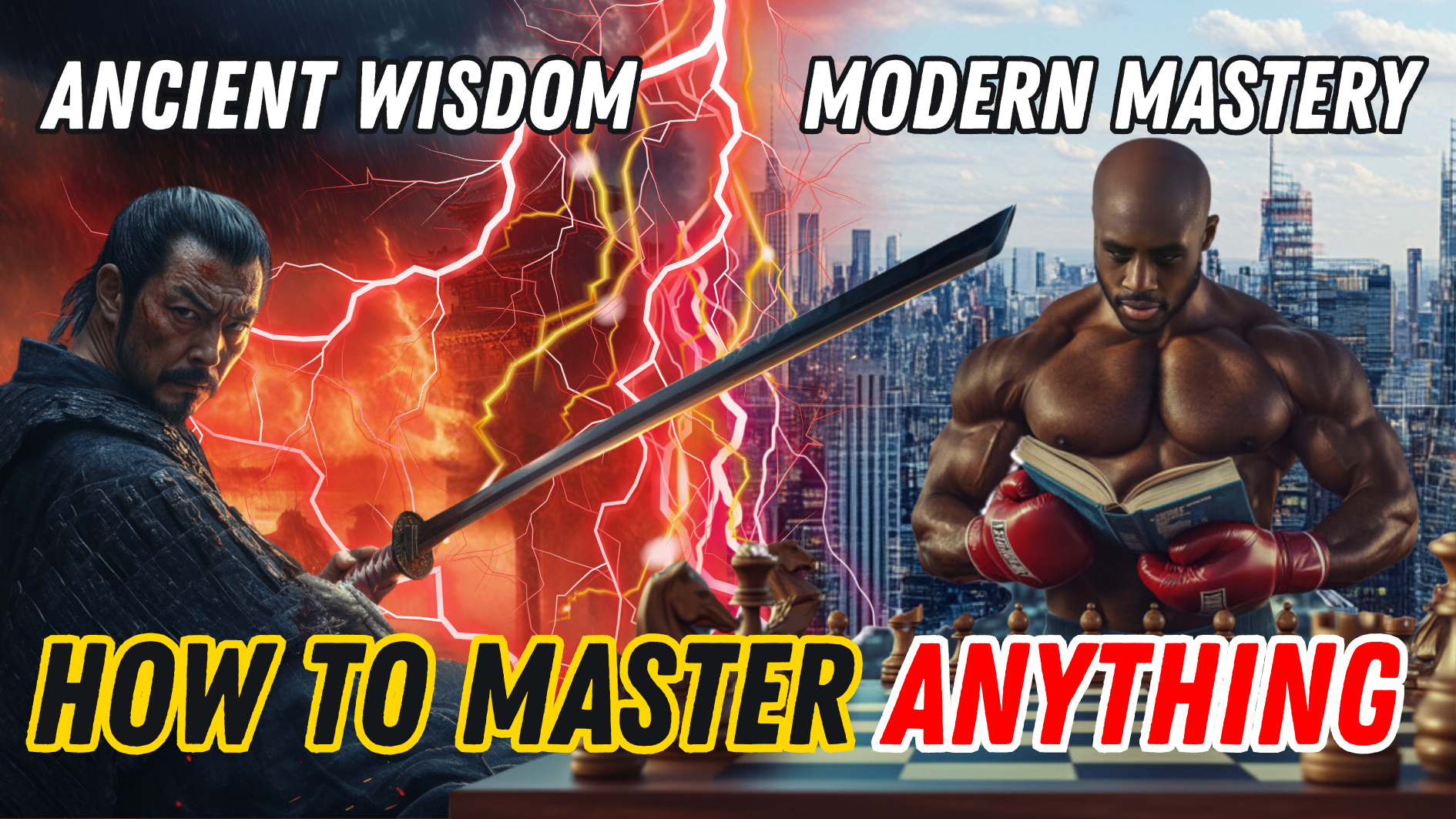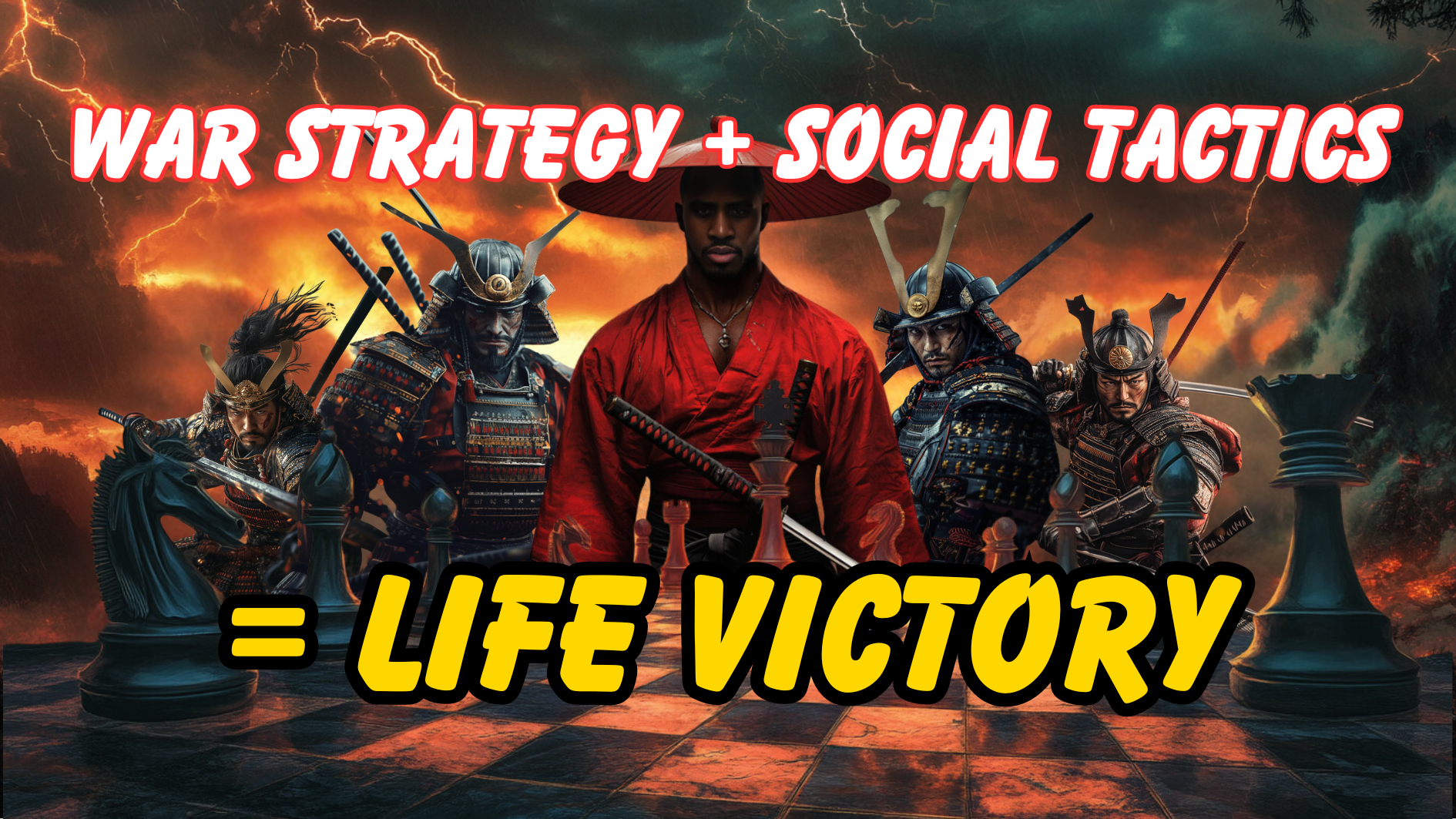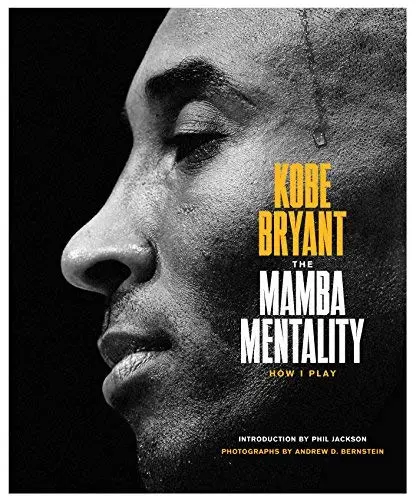Now I want to remind you. I’ve been using these techniques and perspectives my entire life to survive everything from roaming bands of crack addicts to professional fighters and even handling stress while working on my physics degree.
If I can keep calm in the wild landscape of the ghetto, filled with drive-by shootings and unpredictable violence, or in the middle of a heavyweight fight, or dealing with the stress of surviving in the military, fighting professionally, and solving electricity and magnetism problems, I know that you can apply these same principles to stop letting your surroundings hi-jack your emotions.
Whether chopping opponents down in swordfights or practicing calligraphy in the mountains, Musashi knew how to control his emotions. That emotional control is one of the reasons why he won over 60 sword duels to the death.
Most people have at least heard of Musashi’s more famous book, “The Book of Five Rings,” but his lesser known work, “The Dokkodo,” is more impactful and MUCH shorter. It’s so short that it’s not even a book. It’s just 21 sentences that Musashi jotted down the week before his death on how to stay cool, calm, and collected and living the life of a lone warrior.
In this article, I’m not covering all 21 principles (I do that in this article). Instead, we’re going to focus on one big idea:
How to quell anxiety, conquer your fears, and control your emotions are qualities that are as vital today as they were in 17th-century Japan.
When I read the principles, I thought of how similar the ideas were to the stoic philosophy outlined in Marcus Aurelius’s stoic classic, Meditations. This makes sense, as both Musashi and Marcus were warriors, and as such, emotional control was non-negotiable.
By the end of this video, you’ll be armed with four tips from Miyamoto Musashi’s “Dokkodo” that will ensure you never lose your head, literally or figuratively.
But before I get to that, I have to tell you that everything you think you know about anger is wrong. Why?
Why you feel negative emotions in the first place
Everyone has been angry at something or someone before, but have you ever stopped to ask yourself exactly why you experience anger—or any negative emotion—in the first place?
My theory is entirely unscientific, but I believe that every negative emotion stems from two underlying illusions:
The first illusion is the belief that you can change the past.
People waste emotional energy wishing they could change things that have already happened - an impossible task that only creates suffering.
You can’t unhear an insult any more than the person can unsay it.
Apologies attempt to accomplish this, but depending on the severity of the transgression, they are effective at different levels.
The second illusion is the mistaken perspective that the world cares about you.
People take things personally and believe their struggles have special meaning when the universe is indifferent to individual troubles.
Sure, some people close to you may care about your problems or have it out specifically for you, but most people don’t even know you exist, let alone care about what you’re dealing with.
We’ve got our own problems to deal with.
If dealing with those problems happens to cause you a problem, it’s rarely personal.
You’re just collateral damage.
In the comments below, tell me about a time that you took something personal that probably wasn’t personal, and you learned the hard way that you can’t fix everything with an apology.
Musashi understood that he could do nothing about the world, its events, and the people controlling those events.
There’s a great scene in the excellent crime drama—and one of my favorite shows—“The Wire” where a rent-a-cop security guard confronts drug kingpin Marlo Stanfield as he walks out of the store and Marlo says to the security guard:
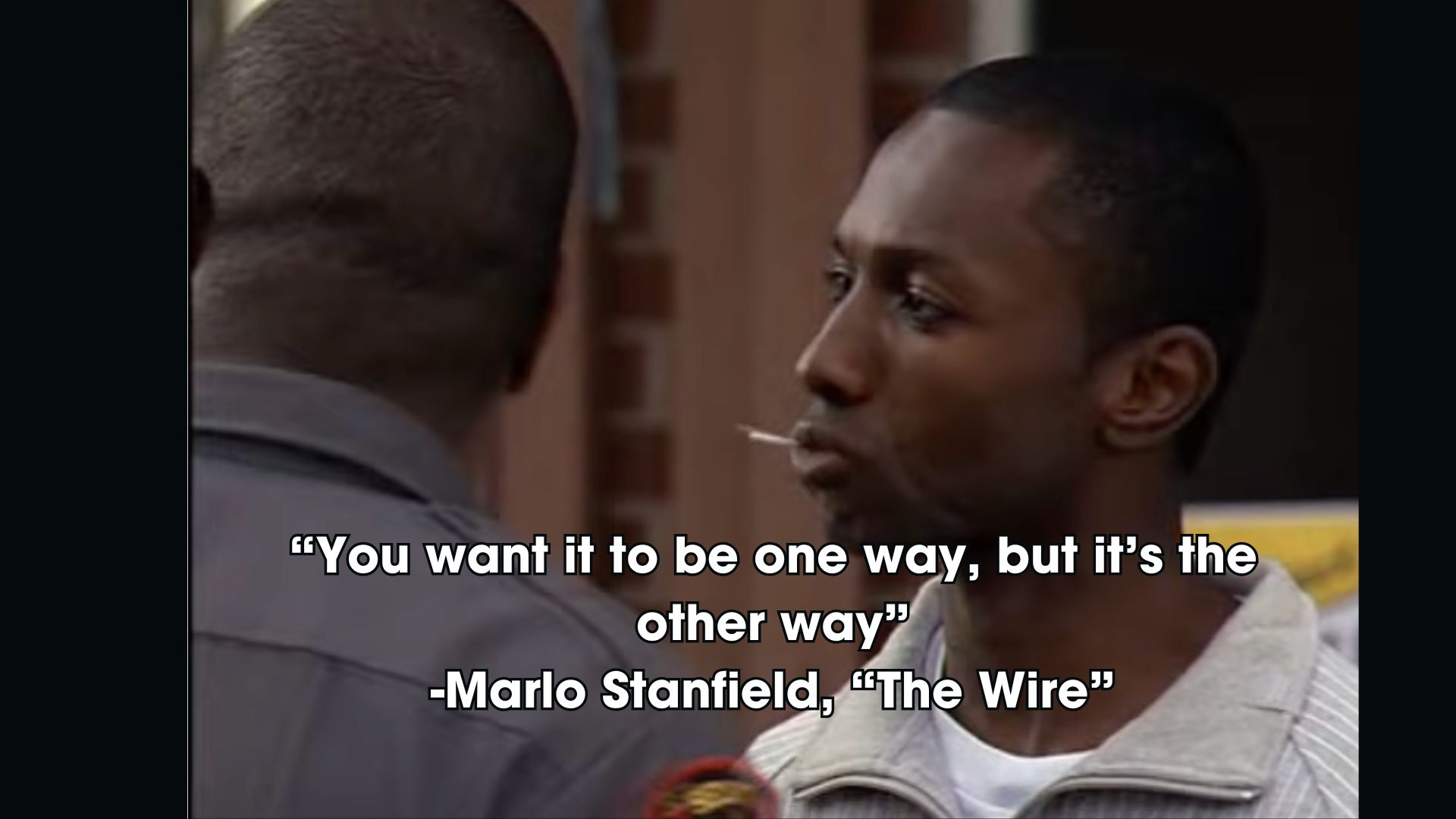
This one scene beautifully demonstrates the difference between people who accept the impersonal brutality of life (spoiler alert—Marlo orders a hit on the security guard for having the balls to interrupt his shoplifting)…
And someone who wants to exert his own opinions and order on the world.
In that one line, Marlo sums up the perspective on life perfectly.
Musashi’s 1st principle in the Dokkodo “is to accept everything just the way it is.”
People push back against this principle because one reasonable interpretation is that you should not bother to change things.
That’s a reasonable response, but it’s simplistic to the point of inaccuracy, grossly imprecise, and sometimes will cost you your life.
Accepting things as they are means you do not wish for them to be anything other than what they are.
Look, if I live in a rough, gang-controlled area, and I ignore this principle, then I might decide I’m going to be righteous and start calling the police and yelling at drug dealers for keeping me and my baby up all night when I’ve got work in the morning.
You can guess how that will probably turn out, but if you can’t, let’s just say that street justice only applies if you break the rules of the street…
And two of those rules are “don’t talk to the police” and “mind your business.”
It’s much better for me to do what I can to move out of my area.
The situation in your life that’s pissing you off probably doesn’t have such dire consequences, but the principle still applies.
Realize that your anger won’t change your environment or the people in it, accept the situation as is, and do what you can to put yourself into a place where “accepting things as they are” works to your benefit.
But you’re probably thinking that this is much easier said than done, and you want a practical method for doing it.
In the most unexpected way possible, Musashi tells us exactly how in some other Dokkodo principles…
Comfortable habits make it harder for you to endure emotional discomfort
Let me tell you about something I learned while training for my fights that perfectly demonstrates another of Musashi’s principles in action.
A little-known fact about me is that I had two cage fights before I went full-time into boxing.
Now, I competed as a heavyweight in boxing, where the minimum weight is 201 lbs because I was around 230 at that time, but I decided to compete as a light heavyweight in MMA, where the maximum is 205 lbs. So, I had to cut weight, and it was a miserable experience—especially the final 24 hours when I was not drinking water.
Anyone who’s done extreme weight cuts knows—it’s pure misery—no water, no food, sitting in saunas until you’re dizzy. Your body screams at you to drink something, anything.
But here’s what’s interesting: the physical discomfort wasn’t what almost broke me. It was the mental anguish of wanting the suffering to end.
See, Musashi has this principle in the Dokkodo that initially seems strange: “Do not pursue the taste of good food.”
Most people think this is about not being gluttonous, but there’s a deeper wisdom here. It’s about not letting your desires control you.
When I was cutting weight, I realized something profound. The physical sensation of thirst was actually manageable. What made it unbearable was my mind constantly thinking about how good a sip of water would feel. The more I focused on wanting the discomfort to end, the worse it became.
This is precisely how negative emotions work.
The actual feeling of anger, fear, or anxiety isn’t what destroys us—it’s our desperate desire to make these feelings stop. The more you fight against a negative emotion, the stronger it gets, like how the more I thought about water during my weight cut, the thirstier I felt.
Instead of fighting these feelings, I learned just to observe them. I feel the physical sensation without letting my mind spiral into wanting it to end. Whether it’s dehydration in training camp or anxiety before a fight, the principle is the same:
Don’t pursue comfort. Don’t run from discomfort. Just let it be.
I chose the discomfort of boxing, and although things went mostly well, most of the time, there was one instance where my emotional control was put to the test yet again…
No one cares how you feel
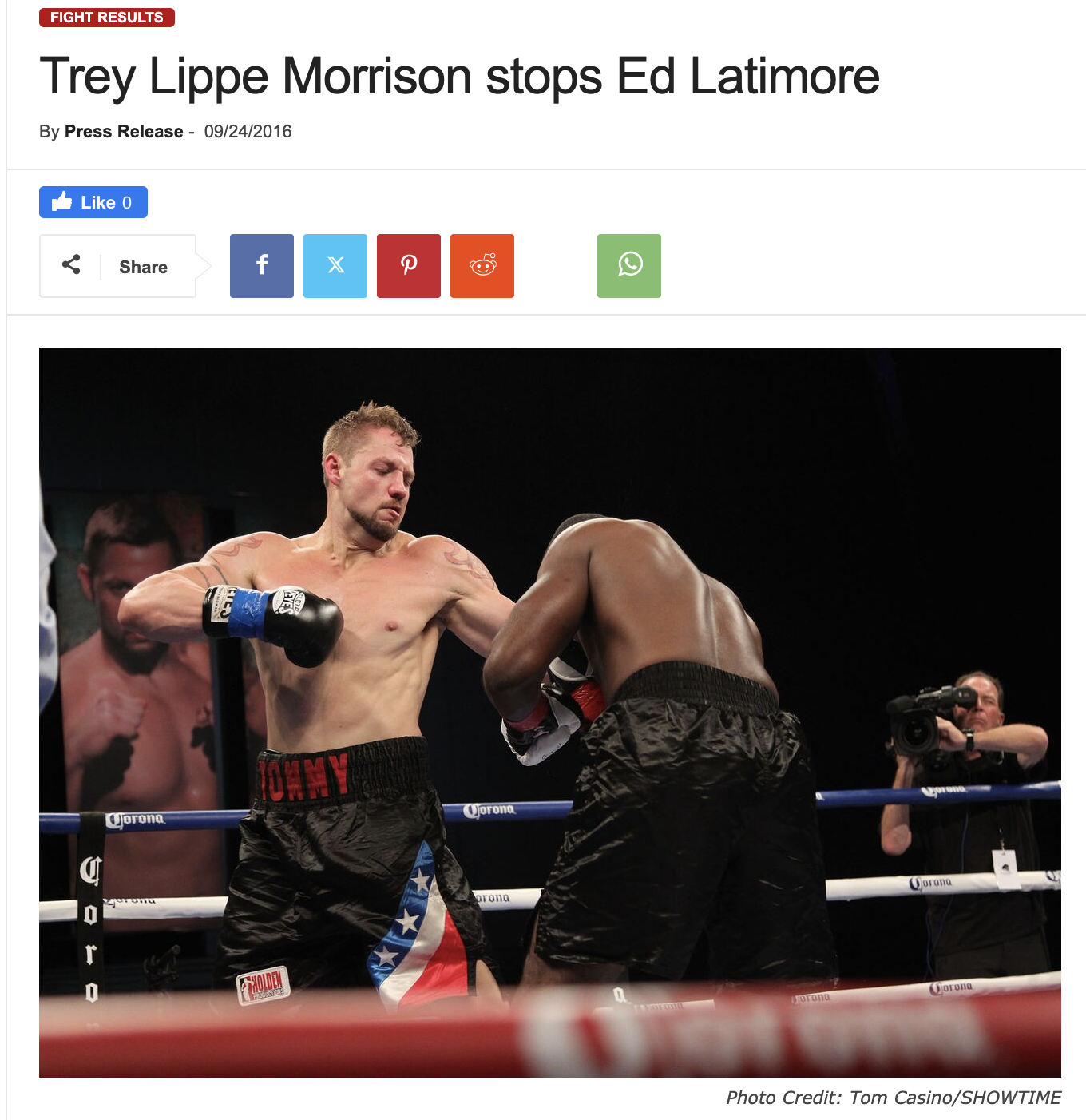
When I suffered my first professional loss, I was embarrassed to the point where I didn’t check social media for days.
The reality is that most people didn’t even know I was fighting, even though I texted and social media blasted everyone about it.
What I realized can be summed up beautifully in a tweet I posted a few years after that incident.
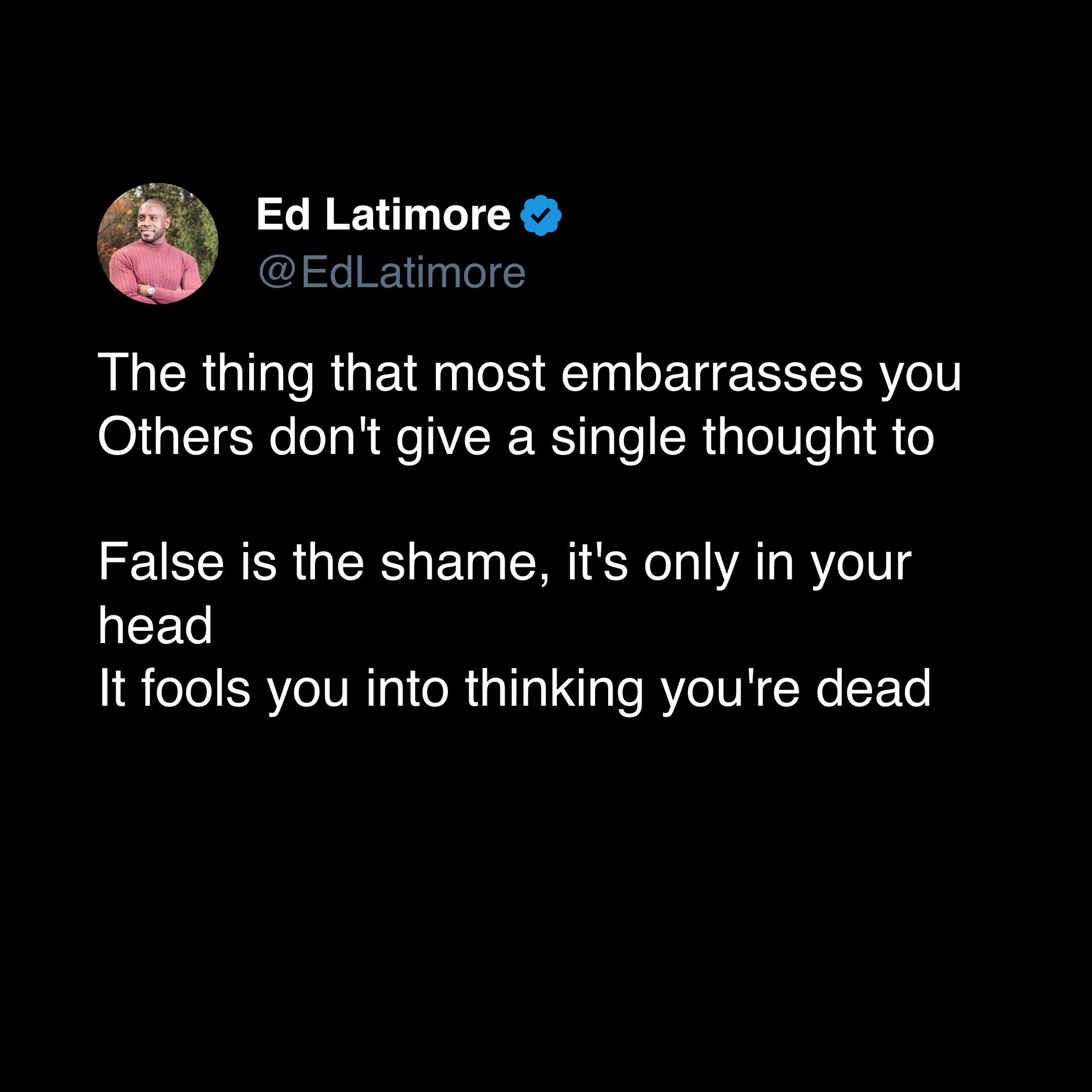
All of your fears and insecurities are not just bared to the world, but it’s done suddenly and violently. It feels so bad that a reaction to embarrassment used to be, “I wish I was dead”
But one of Dokkodo’s principles is not to fear death.
Now, because of his constant sword dueling, Musashi meant this literally, but the idea holds power for controlling negative emotions.
Just remember that no matter how bad things get, eventually, they’ll end—or you will. No one makes it out of this thing called life.
We all die.
And when you die—unless you do something incredibly uplifting or destructive for society—it will take about 150 years before there is no one alive who ever personally interacted with you.
So, all of those people whose opinions you’re worried about? They’re going to die as well. And before they die, they’ll be too busy living ever to remember something stupid you did.
This might not seem like it’s related to dealing with negative emotions, but understanding the ephemeral nature of life is key to realizing something a bit cliche but life-changing:
Life is too short to experience negative emotions
Although Musashi tells us specifically in the Dokkodo not to get jealous and be detached, he doesn’t have to.
Once you fully grasp that this thing called life is going to end for us all, you can start living, and that means not wasting time wallowing in negative emotions.
Accepting death and the implications of wasting life in negative emotions will solve many of your problems, but there is another idea in the Dokkodo that actively works to control negative emotions.
But before we get to that, I have to tell you about the Stoic Street Smarts Blueprint.
The Stoic Street Smarts Blueprint
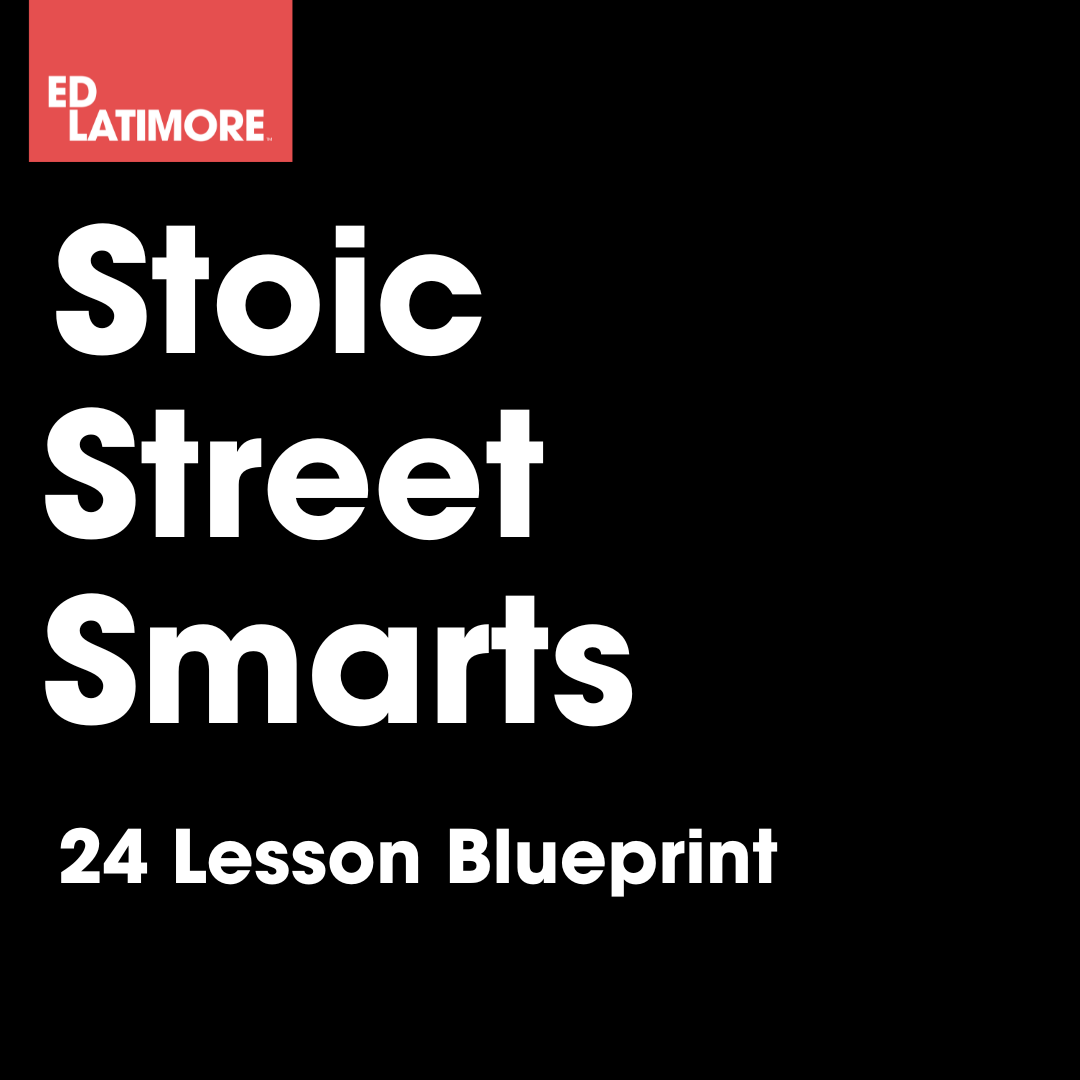
Before I reveal this final principle that completely transforms how you handle negative emotions, I want to tell you about something I’ve created.
These ideas from Musashi’s Dokkodo are just the tip of the iceberg. In my Stoic Street Smarts Blueprint, I break down 24 powerful lessons that combine ancient stoic wisdom with real, street-tested experience.
I’m talking about the exact mindset tools that helped me:
- Stay focused while bullets flew in the projects
- Keep my cool in heavyweight fights
- Maintain composure through a physics degree
- And build an unshakeable mental fortress that no one can penetrate
This isn’t some theoretical philosophy course. These battle-tested principles work whether you’re dealing with office politics or gang politics.
Every Monday and Thursday for 12 weeks, you’ll receive:
- A street-smart stoic lesson that cuts through the BS
- A powerful quote to reshape your perspective
- And a practical assignment to build your mental toughness
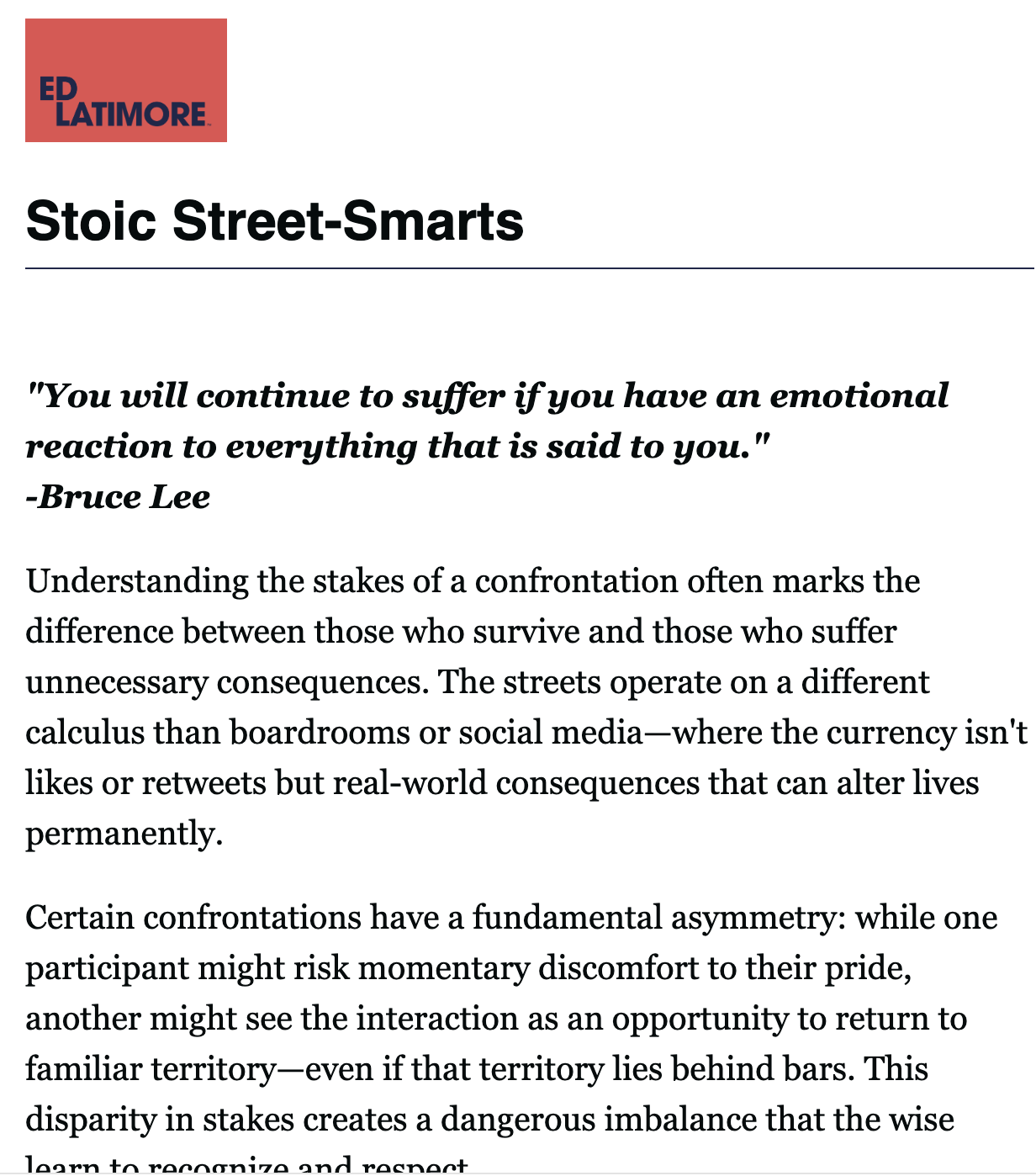
If you’re ready to develop the type of emotional control that made warriors like Musashi legendary, click the link in the description to join the Stoic Street Smarts Blueprint.
Now, let me show you this final principle that ties everything together…
A code of honor makes it easier not to care
Sticking to a code of honor might feel restrictive, but freedom is found in this restriction.
I always tell people a strong value system is the easiest way to make decisions.
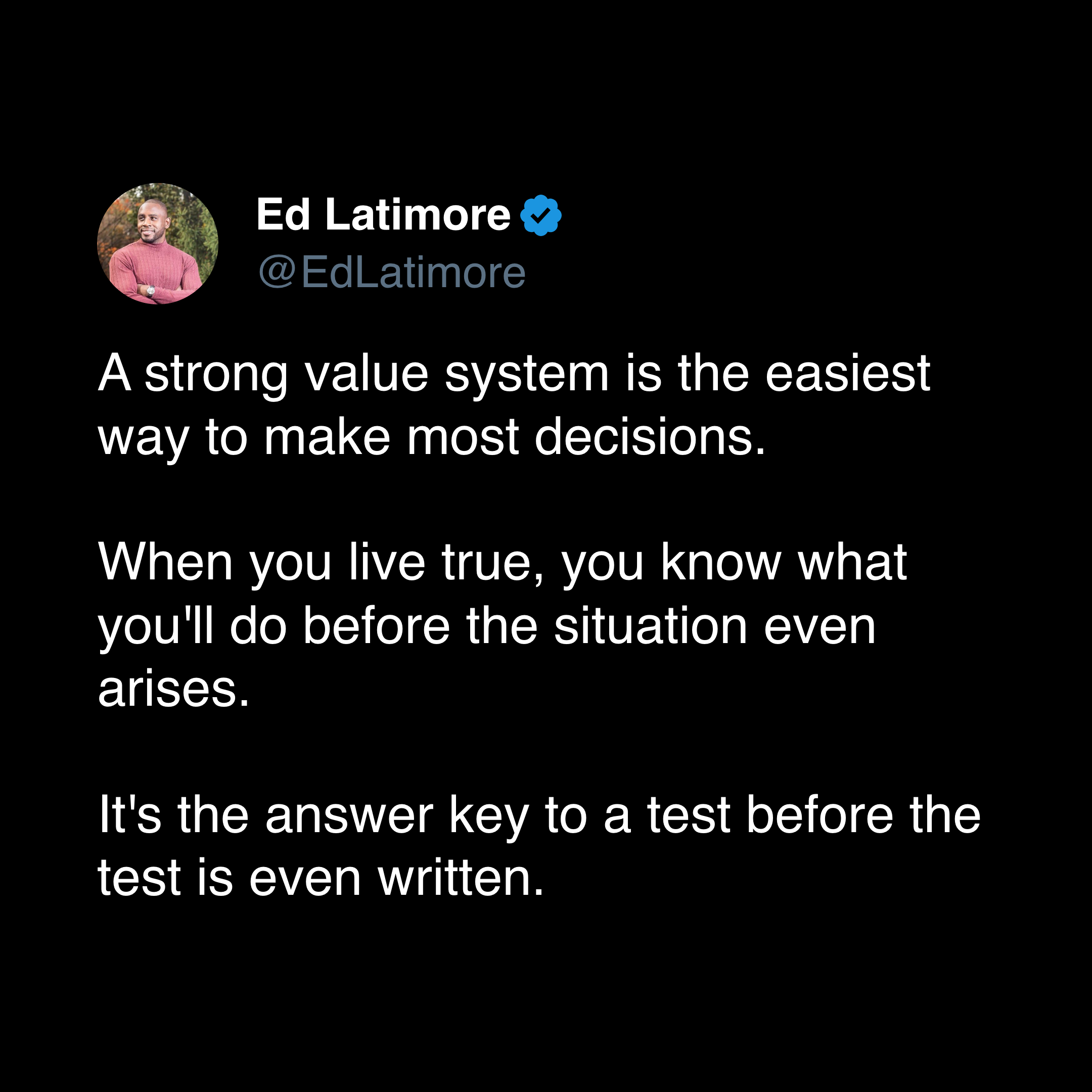
You become free when you already know what lines you won’t cross and influences you won’t allow in your life. Not caring what other people think is a superpower, but it’s readily available to anyone willing to embrace a set of values that leads to a purpose.
This is the secret to not fearing death.
It’s remarkably liberating, and ironically, it’s the natural endpoint of developing emotional control. Once you accept that people have their own problems to deal with…
And that anytime something negative happens to you, it’s impersonal or collateral damage from people pursuing their own interests…
You realize that no one is thinking about you.
In the Dokkodo, Musashi’s 20th principle is “You may abandon your body, but you must preserve your honor.”
Musashi is, in a few words, telling you that if you live so true to your values that you’d rather die than compromise, you have achieved a level of emotional control that frees your mind from any negative thoughts.
Imagine what it would be like to be so committed to your morals and code of honor that the outside world’s opinions are nothing to you.
You’d never feel embarrassed because there is no part of you to expose.
You’d never get sad because you accept the world as it is.
You’d never get angry because you don’t expect anything, so you’d be ready for everything.
An even more effective way to conquer negative emotions?
Now all of these tips from Musashi’s Dokkodo are excellent for helping you to master your emotions and not care what anyone thinks, but you want to know what really helps?
Being good at a lot of different skills because competence breeds confidence.
Fortunately, Musashi also outlined a blueprint for learning any skill.
I break down the lessons on achieving mastery that Miyamoto Musashi teaches in “The Book of Five Rings.”


